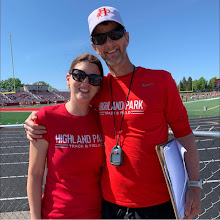So much for getting back to “living like a clock.” Katie had another “episode” 2 nights ago, so I slept-in and just went for an easy 5 over lunch. The nice thing about waiting till lunch is that the weather was perfect – 55 sunny, blue sky, light winds.
Last weekend’s race and yesterday’s hill workout has me thinking about the strengths that different runners possess. I’ll use Deb and Eric as examples. On 4/9 they both ran a 20k. Deb ran 1:18:53 and Eric ran 1:20:00. On 4/30 they both ran a 10k. Deb ran 38:02 and Eric ran 37:14. Basically, Deb had to slow down only 13 seconds per mile to double her distance, while Eric had to slow down 26 seconds per mile. If you plug their 10k times into McMillan’s calculator, their 20k times should be reversed.
Another example, during last night’s hill workout Daniel was running about 5-10 feet behind me on all the hills. On the last repeat I thought “I’m going to bury him.” Instead, he came blowing by me and probably put 10 seconds on me within a half mile. However, during the cool-down, once I stopped dry-heaving, I was running comfortable hard with Jenna while Daniel fell off the back.
Granted these are just 2 examples, but I’m sure we all know people that run great 5Ks, but their marathon times don’t “hold up” or people that can whip themselves into racing shape quickly or run up hills effortlessly. I’m curious if this is due to training or genetic makeup or mental strength or something else.
I suspect a lot of it has to do with genetic makeup, meaning fast twitch vs. slow twitch muscles. Training’s got to have something to do with it too. If you’re doing tempo runs you’re going to be better suited for the longer races. I think part of Daniel’s “problem” is that he’s a triathlete and he hasn’t been doing some of the longer up-tempo runs like Jenna and I have been doing. He’s tough on the hills though – at least the last one.
Subscribe to:
Post Comments (Atom)

3 comments:
I don't know if this fits with your theory, but I also think that women are more likely to be able to hold a pace over a longer distance (not slow down as much as they go longer), not because they have more endurance necessarily, but because they have less raw speed to start with. The woman needs to be more fit just to run the same time for a shorter race, like a 5K or 10K. I'm not basing this on scientific evidence though, just personal experience. It would certainly depend, though, because if the woman were a middle distance specialist who was moving up to the 5K or 10K, she might not be able to hold as good of a pace at the longer distances.
Nice job in the 10K last weekend, by the way!
Yeah, I agree that women tend to slow less than men. Granted, that wasn't the best example.
I know another guy who ran a sub-38 10k, then 4 weeks later ran a sub-3:09 marathon. I believe he was "properly" trained for the marathon. Yet his 10k speed didn't translate to the marathon. It happens all the time.
You said "...if the woman were a middle distance specialist who was moving up to the 5K or 10K, she might not be able to hold as good of a pace at the longer distances."
Unless her name is Amy Rudolph. For those that don't know, Amy ran her debut 10k over the weekend and turned in the 2nd fastest time by an American ever.
"I'm not basing this on scientific evidence though, just personal experience."
There's at least circumstantial evidence, that being women's generally lower muscle-to-total-body-mass ratio. Events from the mile to the 5K and even the 10K may not be traditionally regarded as "power" events, but even in the high end of this range the essential physical differences between men and women come in to play much more strongly than in the marathon. Back when Kim Jones was running in the high 2:20's for the marathon, her 10K times were typically 33+ (though she clearly didn't focus on shorter races) and although Ndereba's 10K best is in the mid-31's (I think), that pales in comparison to a 2:18.
Post a Comment